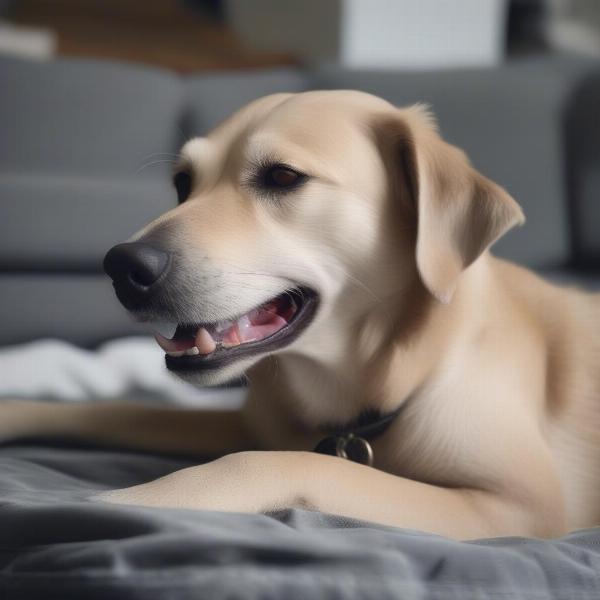Panting is a normal behavior in dogs, a way for them to regulate their body temperature. However, if you’ve noticed your older dog panting more than usual, you might be understandably concerned. Do older dogs pant more? The short answer is: sometimes. While increased panting can be a normal part of aging, it can also be a sign of underlying health issues. This article will explore the reasons why older dogs might pant more, when it’s time to worry, and how to help your furry friend stay comfortable.
Understanding Why Older Dogs Might Pant More
Several factors contribute to increased panting in senior dogs. Age-related changes in the body, such as decreased efficiency in regulating temperature, can make older dogs more susceptible to overheating. Pain, especially from conditions like arthritis, can also cause panting. Cognitive decline, often seen in older dogs, can lead to anxiety and confusion, which can manifest as increased panting. Heart and lung conditions, more common in senior dogs, can also make breathing more difficult, leading to more frequent panting. Lastly, medications, especially pain relievers, can sometimes cause panting as a side effect.
 Older Dog Panting Due to Arthritis
Older Dog Panting Due to Arthritis
When to Worry About Excessive Panting in Older Dogs
While some panting is normal, excessive or unusual panting warrants a visit to the veterinarian. If your dog’s panting is accompanied by other symptoms such as coughing, wheezing, difficulty breathing, lethargy, loss of appetite, or changes in gum color (pale or blue), seek immediate veterinary attention. These could be signs of a serious health problem. Sudden changes in panting patterns, increased intensity, or panting that occurs even when the dog is resting in a cool environment should also be investigated.
Helping Your Senior Dog Stay Comfortable
If your veterinarian has ruled out any underlying medical conditions, there are several ways to help your older dog manage panting and stay comfortable. Maintaining a cool environment is crucial. Ensure your dog has access to shade, fresh water, and air conditioning during hot weather. Regular, low-impact exercise is important for maintaining overall health, but avoid strenuous activity during the hottest parts of the day. A comfortable, supportive bed can help ease pain from arthritis, which can in turn reduce panting related to discomfort. Managing anxiety through calming techniques, such as gentle massage or pheromone diffusers, can also be helpful.
Common Medical Conditions Associated with Increased Panting in Older Dogs
Several medical conditions common in older dogs can cause increased panting. Heart disease, such as congestive heart failure, makes it harder for the heart to pump blood effectively, leading to fluid buildup in the lungs and difficulty breathing. Lung diseases, like pneumonia or bronchitis, can also restrict airflow and cause increased panting. Cushing’s disease, a hormonal disorder, can cause a variety of symptoms, including increased thirst and panting. Pain, especially from arthritis or other degenerative joint diseases, can also lead to increased panting. Obesity can exacerbate breathing difficulties and contribute to increased panting as well.
Conclusion
While increased panting in older dogs can be a normal part of aging, it’s essential to be aware of the potential underlying causes. By monitoring your dog’s panting patterns and seeking veterinary attention when necessary, you can help ensure your senior companion stays comfortable and healthy. Regular checkups, a comfortable environment, and appropriate exercise can all contribute to a better quality of life for your aging furry friend. Remember to always consult with your veterinarian if you have any concerns about your dog’s health.
FAQ
- Why is my old dog panting so much at night? Increased panting at night can be due to pain, anxiety, or underlying medical conditions. Consult your veterinarian to rule out any health issues.
- Is heavy panting in older dogs always a sign of something serious? Not always, but it’s always best to consult with your veterinarian to rule out any potential problems.
- What can I do to help my older dog who is panting heavily? Make sure they have access to fresh water, a cool environment, and a comfortable resting place. Consult your veterinarian for further advice.
- Can pain medication cause panting in older dogs? Yes, some pain medications can cause panting as a side effect.
- How can I tell if my older dog’s panting is normal or not? If the panting is sudden, excessive, or accompanied by other symptoms, consult your veterinarian.
- Are there any specific breeds of dogs more prone to panting in old age? Brachycephalic breeds (those with short noses) are more prone to breathing difficulties and may pant more.
- Can anxiety cause panting in older dogs? Yes, anxiety and cognitive decline can lead to increased panting.
ILM Dog is a leading international dog website dedicated to providing reliable and practical information on all aspects of dog care and upbringing. We offer expert advice on dog breeds, health, training, nutrition, grooming, activities, and much more. Whether you’re a new dog owner or a seasoned expert, ILM Dog is your go-to resource for all things dog-related. For expert advice and support, contact us at [email protected] or +44 20-3965-8624. Visit us at ILM Dog for more information.